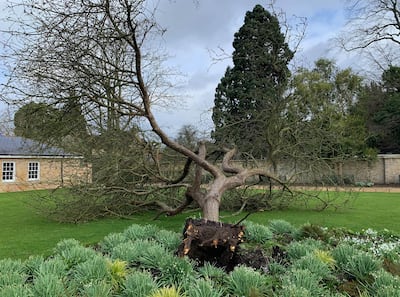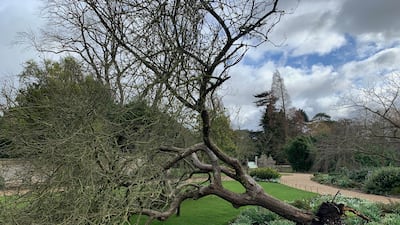A clone of Sir Isaac Newton’s inspiring tree has succumbed to gravity, the very force it helped the physicist to formulate, after being hit by the powerful winds of Storm Eunice.
The Isaac apple tree, which was planted at Cambridge University's Botanic Garden in 1954, fell on Friday.
It was a scion of the original apple tree, which was said to have inspired Newton to develop his theory of gravity when he watched an apple fall from it.
Eunice was the second and most powerful of three named storms to hit the UK in a week. It followed Dudley, the first to hit. On Sunday, Franklin whipped up dangerous winds.
The original apple tree was grown in the garden of Newton's childhood home of Woolsthorpe manor near Grantham in Lincolnshire.
It was “apparently felled in a gale (much like ours) in the early half of the 19th century,” wrote Dr Samuel Brockington, curator of Cambridge University's Botanic Garden.
Dr Brockington said that the Botanic Garden had three clones of the original tree, having “presciently engaged in some grafting over the past three years".

Grafting involves the binding of shoots on to another sapling.
“Through the remarkable science of grafting, our scion of Newton's apple tree will hopefully continue on our collections,” Dr Brockington wrote on Twitter.
Cambridge University Botanic Garden said it had “recently become aware” that the tree, which had stood by the Brookside entrance for 68 years, “had died and the strong winds proved too much".
“We have a clone that will be planted elsewhere in the garden soon, so Newton's apple will remain in the garden, but sadly not in its accustomed place,” it said.
On Sunday, parts of the UK were hit by heavy rain and powerful winds. Waves crashed into coastal areas, homes were destroyed by gales and emergency services put up flood defences along swelling riverbanks.
By Monday, there was severe disruption on many train routes, including between Sheffield and Manchester, Scarborough and Hull, York and Sheffield, Bradford and Leeds, Chester and Manchester, and Carlisle and Newcastle.
Three people in Britain died, including a man in southern England killed when a car hit a tree, another man whose windscreen was struck by debris in north-west England and a woman in her 30s who died in London when a tree fell on a car.
The storm swept ashore in the south-west of England but also smashed into London, where The O2 arena was damaged by huge winds. Winds in England reached almost 200 kilometres per hour.
Storm Dudley left thousands without power in northern England and Scotland on Wednesday.
















